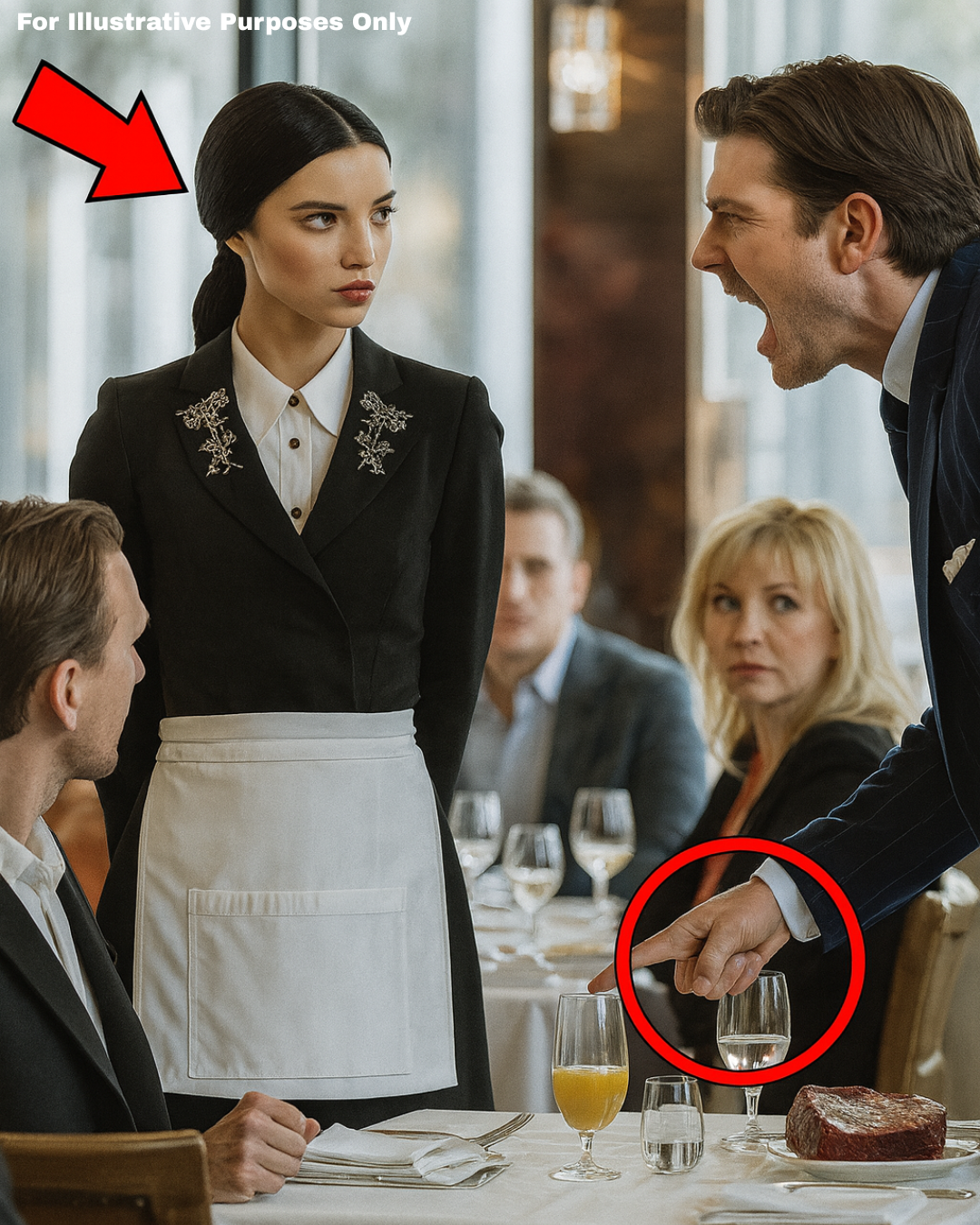Billionaire Yells at Waitress — She Says One Sentence That Freezes the Entire Restaurant
In a world where power and wealth often buy people a free pass to treat others poorly, a rare moment of courage from an everyday worker reminded everyone in a posh restaurant of the power of dignity and words.
The Scene: Elegance Meets Arrogance
It was an ordinary afternoon at La Maison, one of the city’s most exclusive fine-dining establishments. The kind of place where million-dollar deals are signed over $200 steaks and champagne flutes never go empty.
Waitstaff moved with precision, trained to be invisible unless needed. Among them was Alina, a young, poised waitress with a quiet presence and professional grace. Her crisp black-and-white uniform mirrored the polished, luxurious tone of the room. She had served countless guests, from celebrities to CEOs, without ever breaking form.
But on this day, the illusion of civility cracked — loudly.
The Billionaire’s Outburst
Enter Gregory Langston — a venture capitalist known as much for his fortune as for his volcanic temper. With a net worth reportedly north of $4.2 billion, Langston was used to instant obedience. And he expected nothing less from the people serving his lunch.
Something trivial set him off. A misunderstanding about a steak order. It was supposed to be medium rare; it came out medium. Instead of quietly asking for a correction, he erupted.
His voice cut through the elegant hum of conversation like a thunderclap.
“You call this service?” he barked, pointing accusingly at Alina. “This is a $400 meal, and you can’t even follow a simple order! Are you stupid or just lazy?”
The entire restaurant froze.
Forks paused mid-air. Conversations stopped. All eyes turned to the confrontation — and to Alina, who stood silently, hands behind her back, expression unreadable.
Her One Sentence Response
Every person in that room expected the same thing — for Alina to apologize profusely, maybe even call the manager, or shrink away in silence.
But instead, she stood a little taller, looked Gregory Langston directly in the eye, and said one calm sentence:
“I serve food, sir — not egos.”
There was a full five seconds of silence. Then a low gasp. Someone choked on their wine. Others exchanged glances. The room had turned from a fine dining experience into a social reckoning.
Langston, still red-faced, looked stunned. His mouth opened, then closed again. He was used to being feared, not challenged — certainly not by someone he thought was beneath him.
The Aftershock
Alina didn’t shout. She didn’t insult him. She didn’t flinch. Her words, delivered with absolute composure, did more damage than any raised voice could have.
The restaurant manager approached — not to reprimand Alina, but to ask Mr. Langston if he would like to leave.
Several nearby diners quietly clapped under the table. One older woman at a corner booth raised her glass in Alina’s direction. A man in a tailored suit whispered, “That was the most honest thing I’ve heard in this place in years.”
Langston, visibly humiliated, threw a wad of cash on the table and stormed out.
Why It Hit So Hard
What made Alina’s sentence so powerful wasn’t just the bravery. It was the truth behind it.
We live in a culture where service workers are often expected to smile through insults, where the wealthy are rarely told “no,” and where dignity is too often a privilege, not a right.
In those seven words — “I serve food, sir — not egos” — Alina rejected that dynamic entirely. She didn’t disrespect him. She reclaimed her place as a human being, not an accessory to someone else’s wealth or entitlement.
A Viral Moment
Someone at a nearby table captured the entire incident on their phone. Within hours, the video was online. Within 24 hours, it had millions of views.
Hashtags like #IStandWithAlina and #NotYourServant began trending. Celebrities weighed in. Workers from all over the world shared their own stories of mistreatment by wealthy patrons.
A prominent labor rights group even offered Alina a spokesperson role in a campaign for fair workplace treatment.
Langston’s “Apology”
Under massive public pressure, Langston issued a statement three days later. He called his behavior “unacceptable” and claimed he was “under stress due to business matters.” But the apology rang hollow. His reputation had already taken a significant blow.
Investors in his firm reportedly urged him to take a leave of absence.
Meanwhile, La Maison received an outpouring of support for backing their employee. Reservations doubled. Alina was offered a promotion — and politely declined, saying she preferred to stay close to the people.
The Bigger Lesson
This wasn’t just about a steak. It wasn’t just about a billionaire’s tantrum.
It was about something we forget too often — that no matter the size of someone’s bank account, they don’t own the people around them. It was about everyday courage in a moment when silence would have been easier, safer, but far less honorable.
We glorify wealth and power in our society, often to the point where we excuse inexcusable behavior. But one sentence, calmly spoken by a waitress who simply had enough, reminded us that respect is not earned with money — it’s earned with humanity.
Epilogue
A week after the incident, a handwritten note arrived at the restaurant for Alina. It read:
“You reminded me what integrity looks like. Thank you.”
— Signed, a customer who finally saw what truly matters.
Alina never sought fame or applause. She showed up to do her job, to serve food — not egos. But in standing her ground with grace, she served something far greater:
A moment the world needed.


